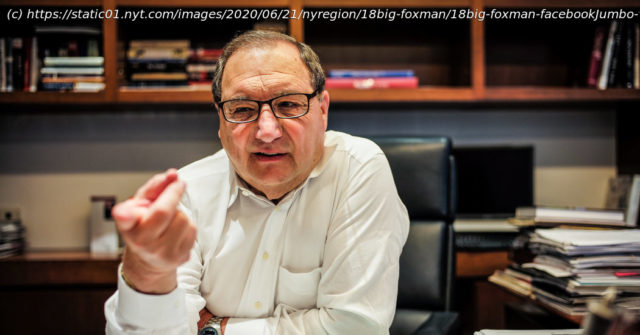How Abraham Foxman, former head of the Anti-Defamation League, became the redemption broker.
It would not be an exaggeration to say that among the managerial class in New York, an anxiety around cancellation has now surpassed any fear of Covid-19. People are at home, restless — scrolling through the past for the potentially offensive gaffe, the expression of an outdated view, the eruption that should have been a gentle reprimand (are reprimands still OK?), the office-party re-enactment of favorite scenes from “Annie Hall.” The revolution — which now extends beyond race to encompass all the ways we communicate across difference — is not interested in your excuses.
While the world is clearly full of people immune to transformation — those whose repeated transgressions, vile or clueless, should make them eligible for elimination — the laziest strain of cancel culture rests on the principle that anyone who has demonstrated an inability to get it, if only on a single occasion, never will. It doesn’t matter whether you are 29 or 45 or 73, you are simply too far gone — a permanent exile in the jurisdiction of the hopeless and unteachable.
To someone like Abraham Foxman, who has devoted his life to trying to eradicate bigotry, this has been a vexing development. Five years ago, Mr. Foxman, who is now 80, retired from his post as the national director of the Anti-Defamation League, which was founded in 1913 to combat anti-Semitism and evolved, throughout the Civil Rights movement and past it, to fight hate and extremism in its many variants.
In his role as a warrior against these contagions, Mr. Foxman also became a pardoner of sins, a guide and absolver to those who worked to right their wrongs and find a way back — when there was a “back” to which one might conceivably return.
His own politics and passions are hardly above reproach. His unwavering support of Israel at all costs has made him seem indifferent to the suffering of Palestinians. But overall he has stood for forgiveness more than what he regards as its counterproductive opposite.
“Now what you’re seeing is one wrong picture, and you are finished for life,” Mr. Foxman told me recently. This is an outcome he finds regrettable. “All my life I was lucky enough to fight prejudice and anti-Semitism,” he said. “If you don’t believe you can change people’s hearts and minds, why bother? If you are not going to try and change hearts and minds, why are you in this business at all?”
For Mr. Foxman, the “business” to some degree involved fielding calls for help from lawyers and agents representing celebrities and other public figures who had incurred the world’s wrath with lapses in sensitivity — with dangerous remarks or derogatory caricatures about Jewish people.






